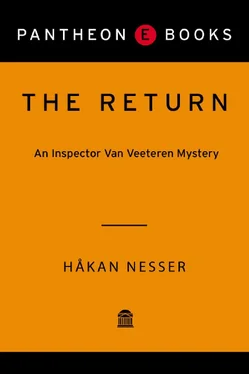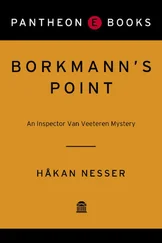Hakan Nesser - The Return
Здесь есть возможность читать онлайн «Hakan Nesser - The Return» весь текст электронной книги совершенно бесплатно (целиком полную версию без сокращений). В некоторых случаях можно слушать аудио, скачать через торрент в формате fb2 и присутствует краткое содержание. Жанр: Полицейский детектив, на английском языке. Описание произведения, (предисловие) а так же отзывы посетителей доступны на портале библиотеки ЛибКат.
- Название:The Return
- Автор:
- Жанр:
- Год:неизвестен
- ISBN:нет данных
- Рейтинг книги:5 / 5. Голосов: 1
-
Избранное:Добавить в избранное
- Отзывы:
-
Ваша оценка:
- 100
- 1
- 2
- 3
- 4
- 5
The Return: краткое содержание, описание и аннотация
Предлагаем к чтению аннотацию, описание, краткое содержание или предисловие (зависит от того, что написал сам автор книги «The Return»). Если вы не нашли необходимую информацию о книге — напишите в комментариях, мы постараемся отыскать её.
The Return — читать онлайн бесплатно полную книгу (весь текст) целиком
Ниже представлен текст книги, разбитый по страницам. Система сохранения места последней прочитанной страницы, позволяет с удобством читать онлайн бесплатно книгу «The Return», без необходимости каждый раз заново искать на чём Вы остановились. Поставьте закладку, и сможете в любой момент перейти на страницу, на которой закончили чтение.
Интервал:
Закладка:
No, there must have been some other reason.
His character.
The kind of man that Leopold Verhaven was. His past. His behavior in court. The overall impression he had made on the jury and the legal bigwigs. That’s what it was all about.
That’s what got him convicted.
Verhaven was an eccentric. Having scrutinized him through the eyes and magnifying glasses of all these journalists, Van Veeteren could hardly come to any other conclusion.
He was very much a loner, a man from whom it was the easi-est thing in the world to disassociate oneself.
An odd man out.
A murderer? It was not difficult to take the short step from the former judgment to the latter, that was something Van Veeteren had learned over many long years; and once you had taken that step, it was not easy to retract it.
And the role?
Was that the key? The strange circumstance that practically every journalist had homed in on. The fact that Verhaven didn’t seem uncomfortable with the role of accused. On the contrary. He seemed to enjoy sitting in the dock with all that attention focused on him. Not that he had strutted or swag-gered, but nevertheless: There was something about the way he conducted himself, a solitary and forceful actor playing the role of the tragic hero. That was how he was perceived, and that was how he had wanted to be perceived.
Something of that sort, in any case.
Was that the reason he was convicted?
If only I’d been there and seen him, I would have had no doubt, Van Veeteren thought as he emptied the bottle.
What actually happened was apparently simple and beyond argument.
Verhaven had returned home that Saturday, at about five o’clock, according to what he and others said. Beatrice had gone off somewhere, and that’s all there was to it. But that was his version. Nobody else had set eyes on either of them later that day. The electrician, Moltke, had left Beatrice at about one o’clock in the afternoon, and Verhaven had been seen in the village the next day, shortly after six on Sunday evening. That was all. The period between those two sightings was a blank.
He would have had plenty of time. For all sorts of things.
One of the medical examiners had been in no doubt that Beatrice had confronted her killer at some point on Saturday or Sunday. She had been strangled and raped. Or the other way around, presumably? Raped and strangled. She was naked; intercourse had taken place, but there was no trace of sperm.
But, thought Van Veeteren, if the killer had been somebody else, that meant it was definite that the murder had taken place on Saturday afternoon-between one o’clock and five o’clock, or thereabouts. Between the moment Moltke had set off for home and Verhaven’s return.
Or at least that she had been abducted during that time.
Irrefutable?
Certainly, he decided. He glared mournfully at the empty bottle, then turned to the transcript from the court proceedings. Day two of the trial. The prosecutor, Hagendeck, cross-questioned the accused, Leopold Verhaven.
May twenty-fourth. Half past ten in the morning.
H: You have pleaded not guilty to killing your fiancee, Beatrice Holden. Is that correct?
V: Yes.
H: Can you tell us a little about your relationship?
V: What do you want to know?
H: How you met, for instance.
V: We bumped into each other in Linzhuisen. We were at school together. She came home with me.
H: That first time? You started a relationship right away?
V: We knew each other previously. She needed a man.
H: When did she move in with you?
V: A week later.
H: So that would be. .
V: November 1960.
H: And she has been living with you ever since?
V: Yes, of course.
H: All the time?
V: She visited her mother and her daughter occasionally.
Stopped over in Elming for the odd night. But more or less all the time, yes.
H: Were you engaged?
V: No.
H: You didn’t intend to get married?
V: No.
H: Why not?
V: That wasn’t why we lived together.
H: Why did you live together, then?
[ Verhaven’s reply erased ]
H: I see. Did you fall out at all?
V: Sometimes.
H: Did you fight?
V: Now and again, I suppose.
H: Did you beat her at all?
V: Yes. She liked it.
H: She liked you beating her?
V: Yes.
H: How do you know? Did she say so?
V: No, but I know she liked it.
H: How can you know that if she never said anything?
V: You can tell. They show it.
H: What do you mean by “they”?
V: Women.
H: Did she hit you as well?
V: She tried, but I was stronger than she was.
H: Did you drink a lot of hard liquor together?
V: No, not all that much.
H: But it did happen?
V: Yes. We used to have a few drinks on a Saturday, seeing as I had Sunday off.
H: Off? Didn’t you have to look after the hens?
V: Yes, of course; but I didn’t have to go to market.
H: I see. Can you tell us what happened on Saturday, March thirtieth? The week before Beatrice
disappeared, that is.
V: We drank a bit. Fell out. I hit her.
H: Why?
V: She annoyed me. I think she wanted a bit of a beating.
H: How did she annoy you?
V: She was being difficult.
H: You beat her so badly that she had to take refuge with a neighbor. It was three in the morning. She had no
clothes on. What do you say to that?
V: She was drunk.
H: But that doesn’t mean she wanted a bit of a beating, does it?
[ No reply from Verhaven ]
H: Don’t you think that was overstepping the mark, beating your fiancee so violently that she had to flee to a neighbor for safety?
V: She didn’t need to go. She was drunk and hysterical.
She came back again later, after all.
H: What about the following week? Did you beat her
several times?
V: No, not that I recall.
H: Not that you recall?
V: No.
H: Why should you forget something like that?
V: I’ve no idea.
H: What did you do when you got back home on
Saturday, April sixth?
V: Made a meal and ate it.
H: Nothing else?
V: Saw to the hens.
H: Where was Beatrice when you got home?
V: I don’t know.
H: What do you mean by that?
V: That I don’t know.
H: Shouldn’t she have been at home?
V: Maybe.
H: Had you arranged anything?
V: No.
H: She hadn’t planned to go anywhere?
V: No.
H: To visit her mother and daughter, for instance?
V: No.
H: Were you surprised that she wasn’t at home when you returned?
V: Not especially.
H: Why?
V: Nothing much surprises me.
H: Tell us what you did the rest of the day.
V: Nothing much.
H: What, exactly?
V: I sat around at home. Watched television. Went to bed.
H: And you still didn’t wonder where your fiancee was?
V: No.
H: Why didn’t you wonder?
V: They come and go.
H: What do you mean?
V: Women. They come and go.
H: Tell us what you did on Sunday.
V: I was at home. I didn’t do anything much. Saw to the hens.
H: And where did you think Beatrice was?
V: I don’t know.
H: It wasn’t that you knew where she was?
V: No.
H: It wasn’t that you knew she was lying dead in the forest, murdered? Nearly a mile into the forest?
V: No.
H: So you didn’t kill her, which would explain why you didn’t wonder where she was?
V: No, that’s not how it was. It wasn’t me who killed her.
H: But you didn’t miss her on Sunday?
V: No.
H: You didn’t check to see if she’d gone to her mother’s, for instance?
V: No.
H: Do you have a telephone, Mr. Verhaven?
Читать дальшеИнтервал:
Закладка:
Похожие книги на «The Return»
Представляем Вашему вниманию похожие книги на «The Return» списком для выбора. Мы отобрали схожую по названию и смыслу литературу в надежде предоставить читателям больше вариантов отыскать новые, интересные, ещё непрочитанные произведения.
Обсуждение, отзывы о книге «The Return» и просто собственные мнения читателей. Оставьте ваши комментарии, напишите, что Вы думаете о произведении, его смысле или главных героях. Укажите что конкретно понравилось, а что нет, и почему Вы так считаете.












